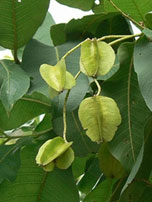Chirbilva

Botanical Name : Holoptelea integrifolia Planch.
Family : Ulmaceae
Introduction :
Latin name: Holoplelea holo = all, ptelia = winged fruit; integrifolia = having leaves with unbroken smooth edges
Names in different Indian languages :
English : Indian elm, kanju
Hindi : Cilbil, kanju
Kannada : Tapasigida
Malayalam : Avil, nettaval
Sanskrit : Chirbilva, puti karanjah
Tamil : Avil, Ayil pattai
Telugu : Tapasi
Synonyms :
Chirbilva, Putika, Prakirya
Morphology :
Medium sized tree with white coloured branches.
Leaves — 2.5 to 20 cms. long and 5 to 10 cm. broad, egg shaped, pointed with transparent spots. Dried leaves exhibit small elevations on the ventral surface Flowers — small, green and in clusters.
Fruits — winged with benttips flowering season is summer f by fruiting. Leaves and trunk have an offensive odour.
Distribution & Habitat :
Throughout India
Chemical constituents :
holoptelin-A, holoptelin- B friedelin, epi-friedelinol.
Properties :
Guna: laghu, ushna
Rasa: tikta, kashaya;
Vipaka: katu;
Virya: ushna;
Karma :
Bedanam, chedanam, deepanam, pachanam, visha nashanam
carminative, digestive, astingent, diuretic, antimicrobial, antifungal, anthelmintic, antiviral, antipyretic, anti-inflammatory
Indication :
Sopham, ajirnam, kandu, vicharchika, kusta, kasa
Rheumatism, scabies, ringworm, cough
Part used :
Bark, leaves, root
Dosage :
Leaf juice 10-15 ml
Powder 2-4 g
Decoction 50-100 ml
External use :
Bark is applied locally as an antiinflammatory.
Internal uses :
Appetizer, digestive. carminative, anthelmintic and cholagogue properties are useful in loss of appetite. ascites. abdominal colic, tumor. piles.